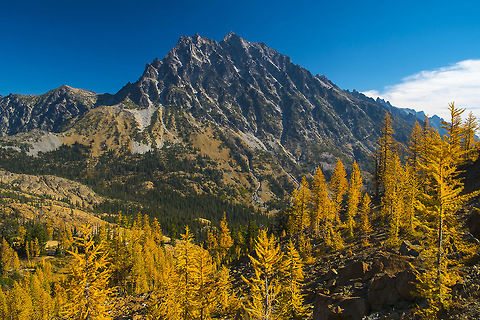
Easy Pass Panorama
Nothing quite like a pano to show off the mountains around here (and it's so easy to image stitch these days). I suppose most people think California or Colorado for this type of vista, but Washington has some really amazing alpine terrain. This area hasn't earned the nickname "The American Alps" for nothing. It's an amazingly wild area too. It's so rugged and remote that most of the area was not logged early in the century in favor of areas that were easier to access. It was also protected quite early - parts were set aside and protected as early as 1897. Pretty much only one paved road runs through the park and there are vast areas that remain totally roadless. Today 93% of the actual national park and a lot of the adjacent land is set aside as Wilderness Area, which means that no additional "improvements" - roads, buildings and the like can be made.
This particular hike is not only breathtakingly scenic, remote and difficult enough to not be a mob scene on weekends, but also of geological interest. The pass that the trail runs up is partly inside of a fault line. There are some places that a small off trail detour to the cliff walls can show you grooves where the two different types of rock on either side of the fault rubbed together.
This view is from a point up a bit from the pass and just shy of about 7,000 feet

''Larix lyallii'', the subalpine larch, or simply alpine larch, is a deciduous, coniferous tree native to northwestern North America. It lives at very high altitudes—1,800 to 2,400 m —in the Rocky Mountains of Idaho, Montana, British Columbia, and Alberta. There is a disjunct population in the Cascade Range of Washington.
Subalpine larch is hardy and can survive very low temperatures in thin rocky soils, which is why the tree is often found near treeline. However, it can grow in.. more
